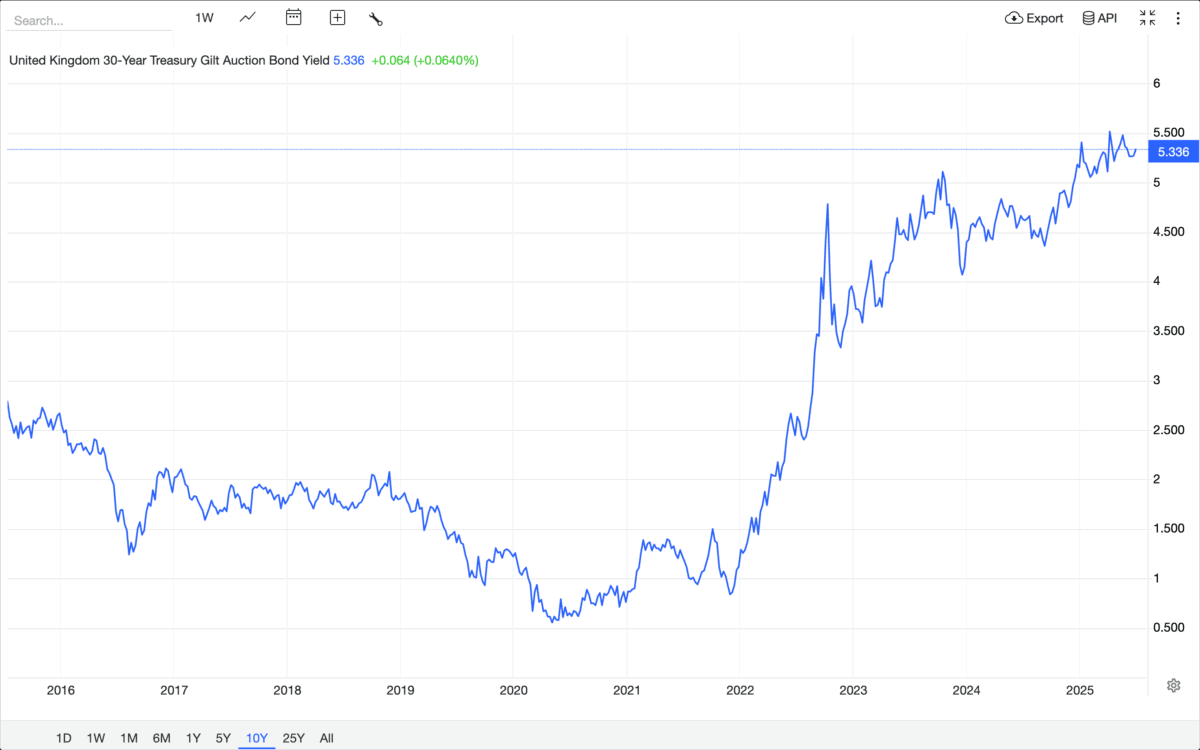Now Reading: Should I lock in a 5.38% yield for 30 years of passive income?
-
01
Should I lock in a 5.38% yield for 30 years of passive income?
Should I lock in a 5.38% yield for 30 years of passive income?


UK 30-year government bonds currently come with a 5.38% yield. With the FTSE 100 offering a dividend yield of 3.36%, that could be interesting for investors looking for long-term passive income.
While bonds are relatively low-risk investments (the chances of the UK government not paying its debts are pretty remote) there’s a catch. The annual return can’t go up over time – and that’s a concern.
Inflation
At today’s prices, a £10,000 investment in 30-year UK government bonds is set to return £538 per year. For context, this is around eight times what investors could have earned five years ago.

Source: Trading Economics
One issue with bonds, however, is inflation. And there are a couple of reasons why this is important.
The first is that rising prices typically result in higher interest rates, which cause the value of long-term bonds to fall. So if rates rise, today’s 30-year bond might be worth less in the future.
From an income perspective, this is the smaller issue. Whatever happens in the markets, the bond matures after 30 years and – barring something extreme – investors get their money back.
The bigger issue is the effect on real returns. Over the last three decades, the UK Consumer Price Index (CPI) has increased by 145.7%, which implies an inflation rate of just over 3% per year.
If that continues, it could seriously cut into real returns over the next 30 years. Put simply, getting £538 in 2055 would be like getting £219 today – and that’s an issue for passive income investors.
The stock market
An alternative approach to passive income involves the stock market. That allows investors to buy ownership stakes in companies and receive a share of the profits in the form of dividends.
The obvious risk with this is that earnings are much more likely to go down than bonds. But with the best businesses, there’s also a chance their net income rises faster than inflation.
Unilever (LSE:ULVR) is a good example. Over the last decade, the firm’s dividend growth has outpaced the CPI, leading to better results for investors, even accounting for inflation.
There is, however, no guarantee of this continuing. One of the risks with Unilever is that it’s easy for people to change to other products, meaning a constant battle to stay ahead of competitors.
The company, however, has two key strengths when it comes to meeting this challenge. The first is its brand portfolio, which customers recognise and trust.
The second is the firm’s vast scale, which allows it to negotiate preferential terms with suppliers and retailers. Together, these make a powerful long-term combination.
Locking in
Unusually high bond yields offer an unusually high passive income return that’s very unlikely to disappear in the next three decades. But investors should be careful about locking this in.
With a return that can’t go up, inflation is a big risk over the long term. By contrast, businesses can – when things go well – increase their dividends over time to offset this threat.
Unilever shares have a 3.5% dividend, which is below the 30-year bond. But with scope to grow as inflation cuts into gilt returns, I think investors should consider the stock over the bond.
The post Should I lock in a 5.38% yield for 30 years of passive income? appeared first on The Motley Fool UK.
5 Shares for the Future of Energy
Investors who don’t own energy shares need to see this now.
Because Mark Rogers — The Motley Fool UK’s Director of Investing — sees 2 key reasons why energy is set to soar.
While sanctions slam Russian supplies, nations are also racing to achieve net zero emissions,
he says. Mark believes 5 companies in particular are poised for spectacular profits.
Open this new report — 5 Shares for the Future of Energy
— and discover:
- Britain’s Energy Fort Knox, now controlling 30% of UK energy storage
- How to potentially get paid by the weather
- Electric Vehicles’ secret
backdoor
opportunity - One dead simple stock for the new nuclear boom
Click the button below to find out how you can get your hands on the full report now, and as a thank you for your interest, we’ll send you one of the five picks — absolutely free!
More reading
- Here’s how investors could target an eventual second income of £1,900 a month, from just £10 a day
- 2 defensive shares for investors to consider for passive income in 2025
- Down 8% from its one-year high, is Unilever’s share price too cheap for me to pass up?
- Buying 500 Unilever shares generates a hands-free income of…
- This FTSE 100 dividend stock could pay me passive income for the next 20 years
Stephen Wright has positions in Unilever. The Motley Fool UK has recommended Unilever. Views expressed on the companies mentioned in this article are those of the writer and therefore may differ from the official recommendations we make in our subscription services such as Share Advisor, Hidden Winners and Pro. Here at The Motley Fool we believe that considering a diverse range of insights makes us better investors.





























:max_bytes(150000):strip_icc()/GettyImages-2219158368-d1f61c66472940c9b62b54335572972d.jpg?w=150&resize=150,150&ssl=1)

